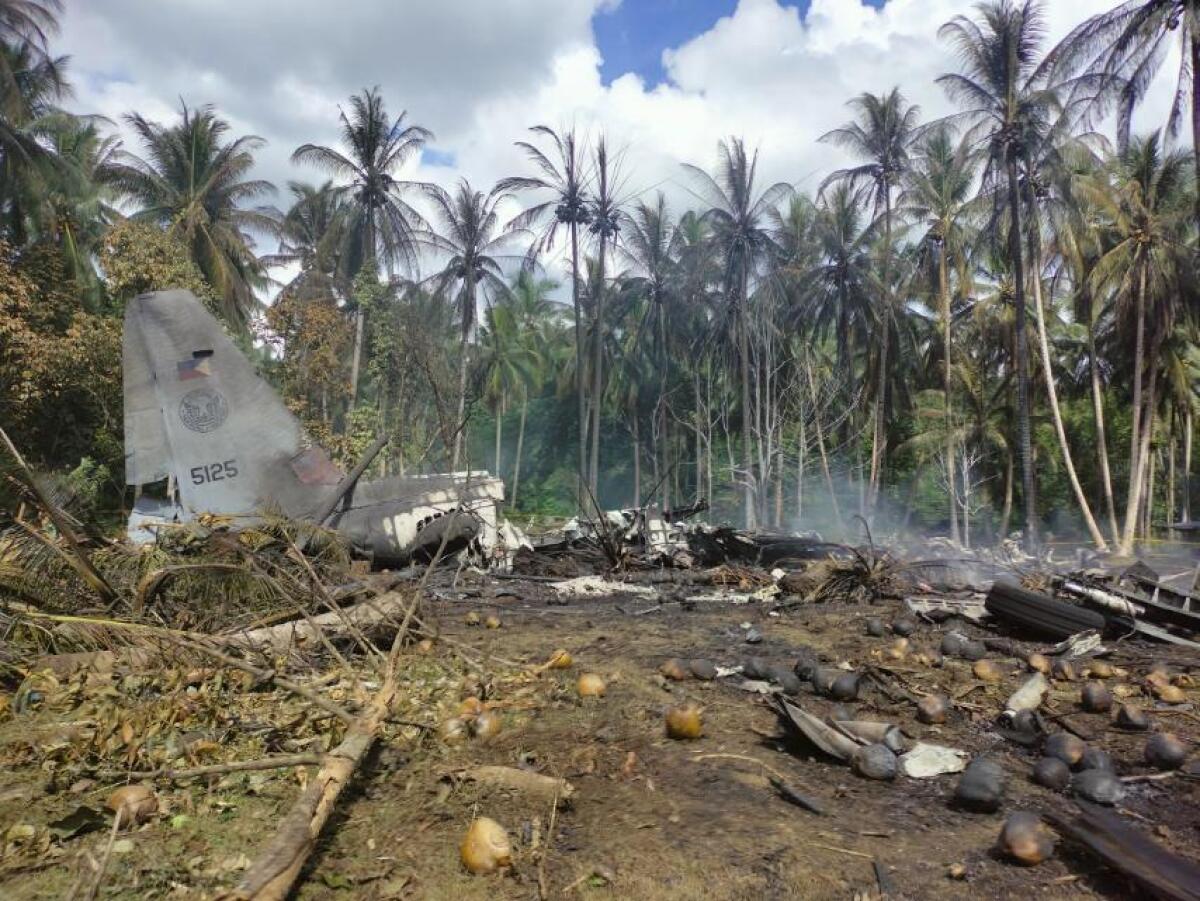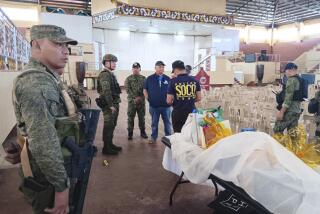45 dead, 49 rescued after military plane crashes in the Philippines

- Share via
MANILA — A Philippine air force C-130 aircraft carrying combat troops crashed in a southern province while landing Sunday, killing at least 42 army soldiers on board and three civilians on the ground, while at least 49 were rescued from the burning wreckage, officials said.
Some soldiers were seen jumping off the aircraft before it crashed and exploded around noon in the periphery of the Jolo airport in Sulu province, military officials said. Two of six villagers who were hit on the ground have died.
Defense Secretary Delfin Lorenzana said rescue and recovery efforts were ongoing. The aircraft had 96 people on board, including three pilots and five crew and the rest were army personnel, the military said, adding 17 soldiers remained unaccounted for by nightfall. The pilots survived but were seriously injured, officials said.
The Lockheed C-130 Hercules was one of two ex-U.S. Air Force aircraft handed over to the Philippines as part of military assistance this year. It crashed while landing shortly before noon Sunday in Bangkal village in the mountainous town of Patikul, military chief of staff Gen. Cirilito Sobejana said.
Military officials said at least 50 people on board were brought to a hospital in Sulu or flown to nearby Zamboanga city and troops were trying to search for the rest. “Per eyewitnesses, a number of soldiers were seen jumping out of the aircraft before it hit the ground, sparing them from the explosion caused by the crash,” a military statement said.
Initial pictures released by the military showed the tail section of the cargo plane relatively intact. The other parts of the plane were burned or scattered in pieces in a clearing surrounded by coconut trees. Soldiers and other rescuers with stretchers were seen dashing to and from the smoke-shrouded crash site.
The plane was transporting troops, many of them new soldiers who had just undergone basic training, from the southern Cagayan de Oro city for deployment in Sulu, officials said.
“They were supposed to join us in our fight against terrorism,” Sulu military commander Maj. Gen. William Gonzales said. Government forces have been battling Abu Sayyaf militants in the predominantly Muslim province of Sulu for decades.
It was not immediately clear what caused the crash. Regional military commander Lt. Gen. Corleto Vinluan said it was unlikely that the aircraft took hostile fire, and cited witnesses as saying that it appeared to have overshot the runway, then crashed in the periphery of the airport.
“It’s very unfortunate,” Sobejana told reporters. “The plane missed the runway and it was trying to regain power but failed and crashed.”
An air force official told the Associated Press that the Jolo runway is shorter than most others in the country, making it more difficult for pilots to adjust if an aircraft misses the landing spot. The official, who has flown military aircraft to and from Jolo several times, spoke on condition of anonymity because of a lack of authority to speak publicly.
Initial pictures showed that the weather was apparently fine in Sulu although other parts of the Philippines were experiencing rains due to an approaching tropical depression. The airport in Sulu’s main town of Jolo is a few miles from a mountainous area where troops have battled Abu Sayyaf militants. Some militants have aligned themselves with the Islamic State group.
The U.S. and the Philippines have separately blacklisted Abu Sayyaf as a terrorist organization for bombings, ransom kidnappings and beheadings. It has been considerably weakened by years of government offensives but remains a threat.
President Rodrigo Duterte expanded the military presence in Sulu into a full division in late 2018, deploying hundreds of additional troops, air force aircraft and other combat equipment after vowing to wipe out the Abu Sayyaf and allied foreign and local gunmen.
Government forces at the time were running after Muslim armed groups a year after quelling the five-month siege of southern Marawi city by hundreds of militants linked to the Islamic State group. More than 1,000 people, mostly militants and long-elusive Abu Sayyaf commanders, were killed in months of intense air and ground assaults.
Sunday’s crash comes as the limited number of military aircraft has been further strained, as the air force helped transport medical supplies, vaccines and protective equipment to far-flung island provinces amid spikes in COVID-19 infections.
The Philippine government has struggled for years to modernize its military, one of Asia’s least equipped, as it dealt with decades-long Muslim and communist insurgencies and territorial rifts with China and other claimant countries in the South China Sea.
More to Read
Sign up for Essential California
The most important California stories and recommendations in your inbox every morning.
You may occasionally receive promotional content from the Los Angeles Times.









